Introduction
In the realm of natural beauty treatments, turmeric has emerged as a powerful ingredient for skincare routine. From treating acne scars to brightening skin tone, this golden spice offers numerous benefits. Our focus today is on using turmeric for dark spots.
Understanding Dark Spots
Dark spots, also known as hyperpigmentation, are patches of skin that appear darker than the surrounding skin. This is a common and usually harmless condition where certain areas of skin produce more melanin, the pigment that gives skin its color.
Hyperpigmentation can occur in small patches, cover large areas, or affect the entire body. These spots and patches can be a few shades darker than your natural skin tone or they can be quite dark. The color of dark spots can also vary, depending on your skin tone.
There are several causes of hyperpigmentation, the most common being sun exposure. The harmful UV rays of the sun can trigger an overproduction of melanin, leading to the formation of dark spots or patches, often referred to as sunspots or age spots.
Hormonal fluctuations are another common cause of hyperpigmentation. Conditions like pregnancy, menopause, or certain medications can lead to an increase in melanin production, resulting in what is often called melasma or "the mask of pregnancy".

Acne scarring is another factor that can lead to dark spots. When an acne breakout heals, it can leave behind a dark spot or discoloration, which is a form of post-inflammatory hyperpigmentation.
The likelihood of developing dark spots can also depend on your skin type. For instance, people with darker skin tones are more prone to hyperpigmentation due to the higher concentration of melanocytes, the cells that produce melanin.
Understanding your skin type and how it reacts to various treatments is crucial to maintaining healthy skin. Different skin types may require different care routines and treatments to manage hyperpigmentation effectively. For example, sensitive skin might react adversely to harsh chemical treatments, while oily skin may require specific products to prevent clogged pores that might lead to acne and subsequent dark spots.
While dark spots are usually harmless, they can be a cause of cosmetic concern for many. Knowing the causes and understanding your skin type can help you prevent and effectively treat hyperpigmentation.
Turmeric: A Natural Solution for Dark Spots
Turmeric, thanks to its active ingredient curcumin, has anti-inflammatory and antioxidant properties that can help reduce dark spots. Its regular use as a mask or in a daily routine can lead to noticeable changes in skin health over a few weeks.
Turmeric for Dark Spots Before and After: Real Stories
The effectiveness of turmeric in fading dark spots is not just a matter of scientific research. A quick browse through the internet reveals numerous real-life testimonials from individuals who have experienced firsthand the transformative power of this golden spice.

These testimonials emphasize the importance of consistent use when it comes to seeing results with turmeric. While it may not provide an overnight solution, incorporating a turmeric treatment into your skincare routine and sticking to it can lead to noticeable improvements over time. From fading dark spots to improving overall skin health, these real stories testify to the potential of turmeric as a natural and effective skincare ingredient.
The Science Behind Turmeric's Effectiveness Against Dark Spots
While turmeric and curcumin are powerful on their own, they can be even more effective when combined with other ingredients. For instance, lemon oil is known for its natural skin-brightening properties due to its high vitamin C content. When mixed with turmeric, it can enhance the skin-lightening effect, making the combination an effective treatment for dark spots.
Similarly, milk contains lactic acid, an alpha hydroxy acid (AHA) that can gently exfoliate the skin, removing dead skin cells and revealing a brighter complexion. Combining milk with turmeric can create a potent mask that not only lightens dark spots but also improves overall skin texture.
Honey, on the other hand, is a natural humectant that can moisturize the skin and has antibacterial properties that can help fight acne. Adding honey to a turmeric mask can thus provide hydration, combat acne, and assist in fading scars.
Turmeric's primary compound, curcumin, plays an integral role in managing skin discoloration, including dark spots. Moreover, when combined with ingredients like lemon oil, milk, or honey, turmeric becomes a versatile treatment for various skin issues, enhancing not just the skin's appearance but also its health.
Glo Melanin's Turmeric and Lemon Lip Balm is an innovative product in the market that combines the benefits of lemon oil and turmeric. This lip balm, crafted with 100% natural ingredients, aims to nourish and soften dark lips. The formulation is vegan-friendly, and free from parabens, sulfates, and preservatives, making it a safe choice for conscious consumers.
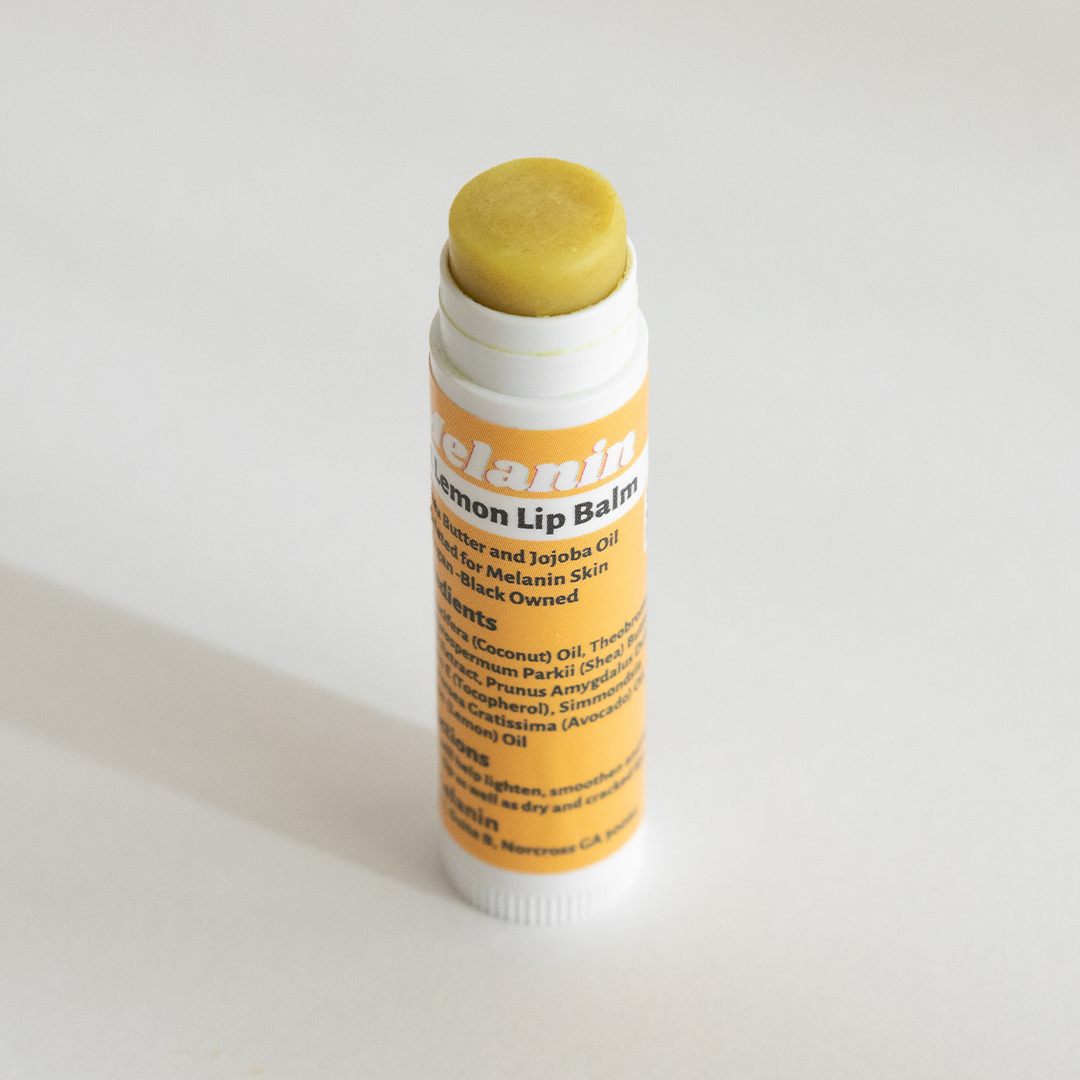
It integrates a blend of potent components like beeswax, cocoa butter, avocado oil, shea butter, coconut oil, sweet almond oil, vitamin E oil, jojoba oil, along with the star ingredients - turmeric and lemon oil. Customers have attested to its efficacy, praising its ability to smoothen lips, enhance lip color, and lighten dark spots. The lip balm not only delivers on its promises but also offers a pleasing texture and a refreshing scent. You can find more information about this product on their website.
Turmeric and Sensitive Skin: What You Need to Know
While turmeric is generally gentle on the skin, those with sensitive skin should use it with caution to avoid any skin irritation. It's recommended to do a patch test before applying a turmeric product or any other treatment on the entire face or body.
Turmeric for Acne Scars: Another Benefit
Acne is a common skin condition that affects millions of people worldwide. It's characterized by the occurrence of pimples, blackheads, whiteheads, and often leaves behind unsightly scars. For those with acne-prone skin, turmeric can offer multiple benefits due to its potent properties.
Turmeric's primary active ingredient, curcumin, possesses strong anti-inflammatory properties. Inflammation is a significant factor in the development of acne. When your pores become clogged with excess sebum (oil) and dead skin cells, it creates an environment where bacteria can thrive. This bacterial growth leads to inflammation, which manifests as red, swollen acne lesions. By reducing this inflammation, turmeric can help alleviate the symptoms of active acne.
In addition to curcumin's anti-inflammatory benefits, it also has antimicrobial properties that can combat Propionibacterium acnes, the bacteria known to cause acne breakouts. This can help prevent new acne lesions from forming, further benefiting those with acne-prone skin.
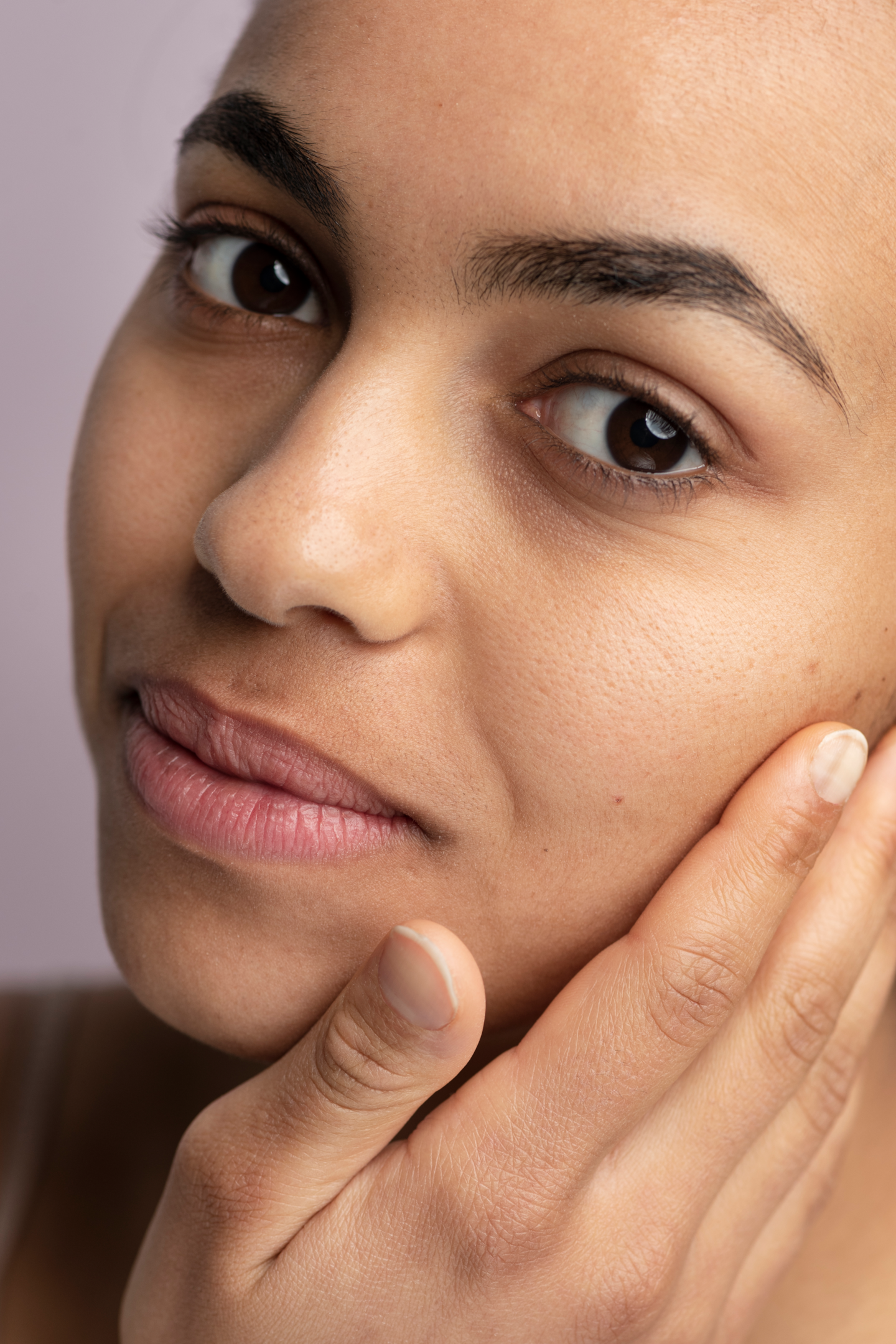
Moreover, turmeric's ability to regulate melanin production can be beneficial for fading acne scars. As mentioned earlier, curcumin inhibits the enzyme tyrosinase, which is crucial for melanin production. Acne scars, particularly post-inflammatory hyperpigmentation, occur due to an overproduction of melanin in response to skin inflammation. By regulating melanin production, turmeric can aid in reducing the appearance of these scars and promote a more even skin tone.
To incorporate turmeric into your skincare routine, numerous skincare products on the market contain turmeric, ranging from cleansers to spot treatments.
Turmeric's anti-inflammatory and antimicrobial properties make it a beneficial ingredient for acne-prone skin. Furthermore, its ability to regulate melanin production can help reduce the appearance of acne scars, making it a comprehensive solution for those struggling with acne-related skin issues.
The Glo Melanin Raw Manuka Honey and Turmeric Face Wash is currently one of the best turmeric-based products for tackling acne on the market. This face wash is formulated with all-natural ingredients, including the potent combination of turmeric, raw manuka honey, and hemp seed oil. The product is vegan-friendly and free from parabens and sulfates, making it a safe choice for those who prefer clean skincare.
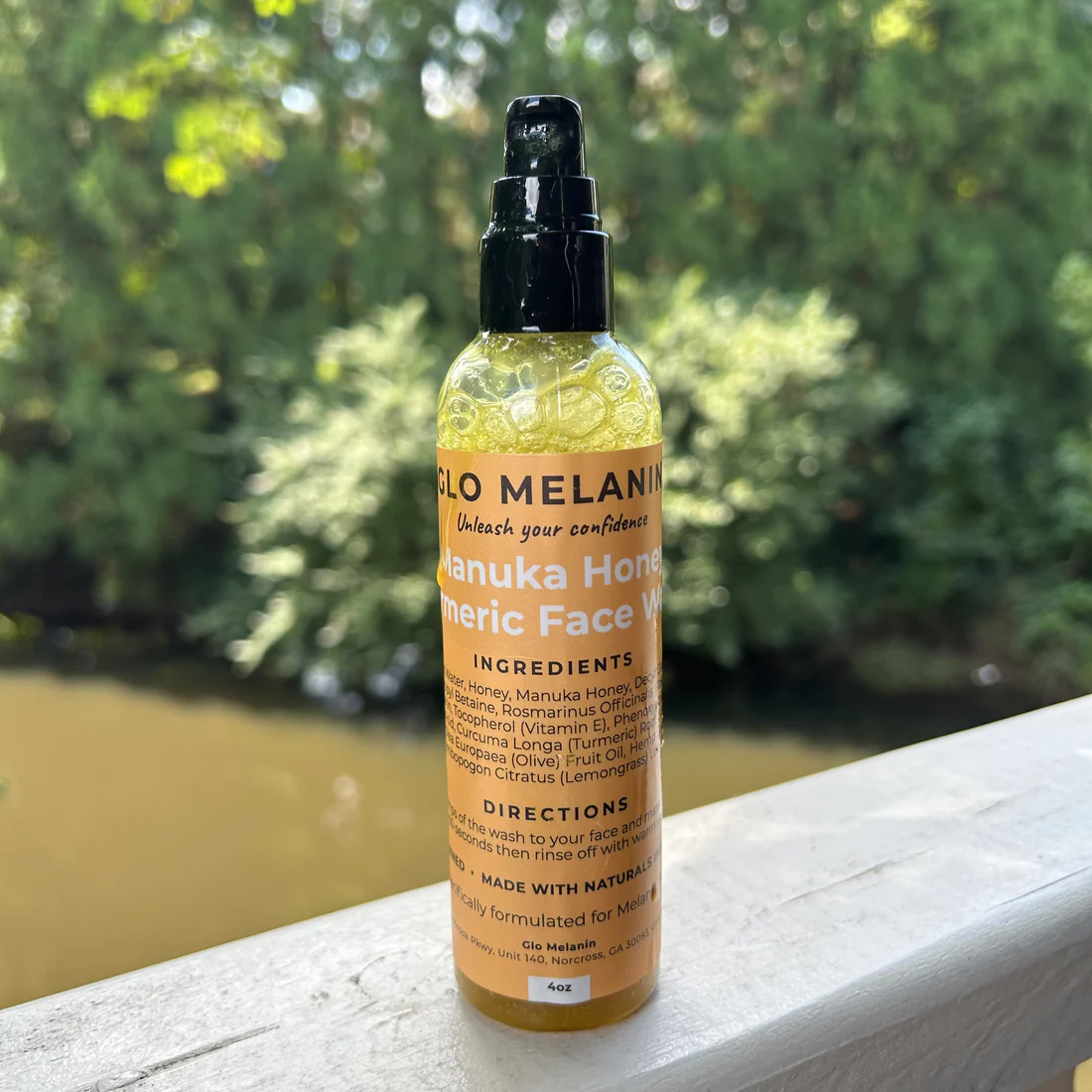
This face wash is gentle on the skin and doesn't strip away its natural protective layers. Many customers have reported noticeable improvements in their skin within the first month of consistent use. Non-comedogenic and dermatologist-approved, this product is suitable even for sensitive skin types. You can find more information about this product and make a purchase on their website.
Turmeric Masks for Dark Spots
A turmeric face mask can be an effective and affordable way to reduce dark spots. The Glo Melanin Turmeric Mask with Sea Moss, Aloe, and Raw Honey is currently being hailed as one of the best turmeric masks for achieving radiant skin. This product has a unique formulation that combines the potency of turmeric with the nourishing properties of sea moss, aloe, and raw honey.
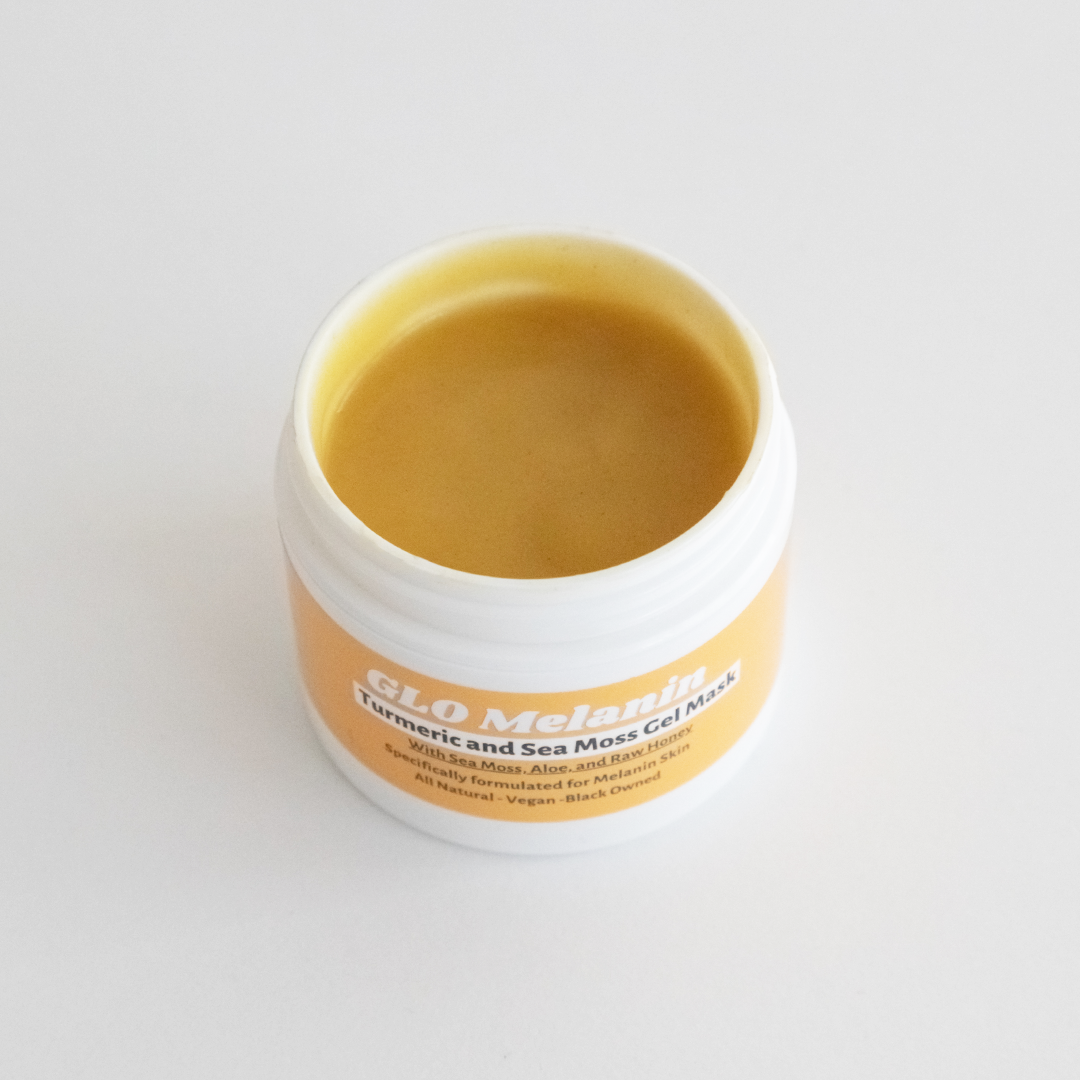
Sea moss, rich in minerals and vitamins, helps combat bacterial acne and other skin conditions. Aloe and raw honey provide added moisture and soothing effects, making this mask an excellent choice for maintaining healthy skin. The Glo Melanin Turmeric Mask is made with all-natural ingredients, ensuring it's safe and effective for various skin types.
Best Practices for Using Turmeric on Oily Skin
For those with oily skin, using turmeric can be a balancing act. While it has benefits for all skin types, it's essential to prevent future breakouts by not overusing it.
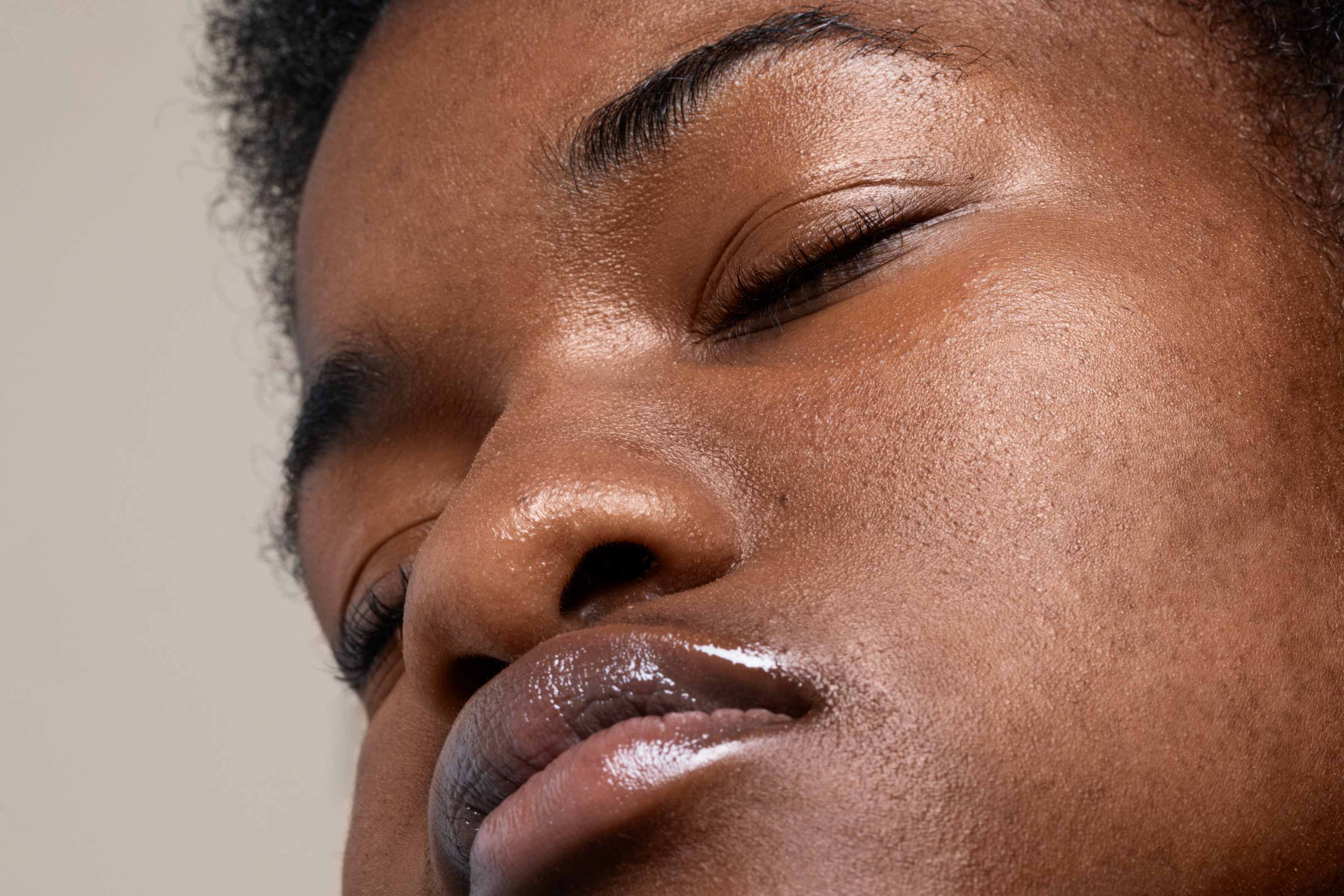
Combining it with ingredients like aloe vera or honey can provide the best results.
Commercial Products: Turmeric Infused Skincare
Turmeric, with its potent anti-inflammatory and antioxidant properties, has been recognized as a valuable skincare ingredient. Today, the market is filled with various turmeric-infused skincare products, from serums and masks to dark spot correctors. These products often marry the natural benefits of turmeric with scientifically-backed active ingredients like salicylic acid, hyaluronic acid, and vitamin C for enhanced effects.
Serums are lightweight skincare products designed to deliver high concentrations of active ingredients directly into the skin. Turmeric-infused serums often combine curcumin's skin-nourishing properties with other powerful ingredients. For instance, hyaluronic acid is a popular addition due to its ability to retain moisture, thus providing deep hydration and reducing fine lines and wrinkles. Vitamin C, known for its brightening and anti-aging benefits, can work synergistically with turmeric to reduce hyperpigmentation and promote a more radiant complexion.
Dark spot correctors are targeted treatments designed to fade hyperpigmentation. Turmeric's potential to inhibit melanin production makes it a beneficial ingredient for these products. When combined with vitamin C, another potent skin-brightening ingredient, a turmeric-infused dark spot corrector can effectively reduce the appearance of dark spots and enhance overall skin tone.
The Glo Melanin Dark Spot Corrector Serum stands out as one of the best turmeric serums currently available for treating dark spots. This powerful, all-natural serum is specially formulated to address post-inflammatory hyperpigmentation, sunspots or melasma, and uneven skin tones. Its potent ingredients list includes Licorice Root, Turmeric, Alpha Arbutin, Niacinamide, and Kojic Acid, all of which are renowned for their skin-healing properties.
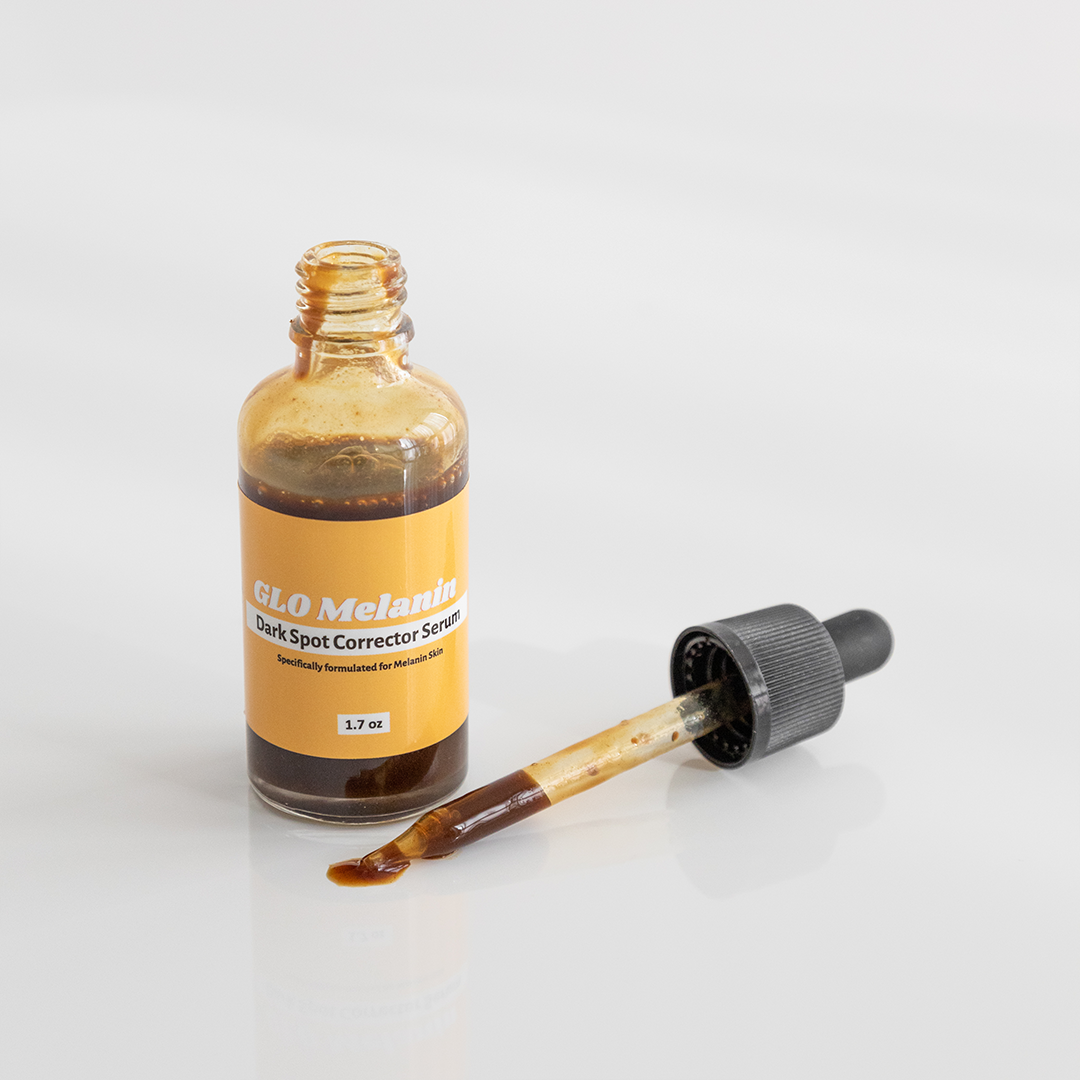
The turmeric in the serum acts as a natural anti-inflammatory and antioxidant, helping to soothe the skin and reduce pigmentation. Notably, the product is safe for use during pregnancy and is also suitable for individuals with sensitive skin. It doesn't leave any stains or tint on the skin, ensuring that your face remains naturally radiant.
The myriad of turmeric-infused skincare products available in the market provide a testament to turmeric's value in skincare. By combining turmeric with scientifically-backed active ingredients, these products offer a holistic approach to skincare that caters to various skin concerns, from hydration and anti-aging to acne and hyperpigmentation.
Possible Side Effects of Using Turmeric on Skin
While turmeric is celebrated for its many skincare benefits, it's crucial to understand that everyone's skin may react differently to new ingredients. As a potent spice, turmeric can cause skin irritation in some individuals, especially those with sensitive skin.
Sensitive skin is characterized by a heightened tendency to react to certain substances, often resulting in symptoms like redness, stinging, burning, or itching. When applying a powerful ingredient like turmeric, these reactions could potentially be triggered.
Although rare, some people may have an allergic reaction to turmeric, leading to contact dermatitis. Symptoms of this can include redness, swelling, itchiness, or hives. If you notice any of these signs after using a product containing turmeric, it's essential to stop usage immediately and consult a healthcare professional or a board-certified dermatologist if needed.
To avoid potential adverse reactions, it's always recommended to perform a patch test before incorporating turmeric or any new ingredient into your skincare routine. A patch test involves applying a small amount of the product on a discreet area of skin, such as the inside of your wrist or elbow, and waiting for 24 to 48 hours to see if any adverse reactions occur.
In addition to a patch test, it's also a good practice to start with a low concentration of turmeric and gradually increase it based on your skin's tolerance. This is particularly important for those with sensitive or acne-prone skin as they may have a higher risk of experiencing irritation.
Moreover, turmeric can temporarily stain the skin a yellow-orange color, especially for lighter skin tones. While this is usually not a cause for concern and can be washed off with soap and water, it's something to keep in mind when considering using turmeric for skincare.
While turmeric is generally safe for topical use, it's important to take necessary precautions. Always remember to do a patch test, start with a lower concentration, and be aware of possible temporary staining.
Also check out: Unleash your skin's natural radiance! Dive into this comprehensive guide filled with Melanin Glow: Tips and Products for Radiant Skin to help you achieve that sought-after healthy glow.
Turmeric for Dark Spots: Frequently Asked Questions
Turmeric has been hailed as a miracle spice, boasting numerous health and beauty benefits. Its use in skincare, particularly for reducing dark spots, has sparked interest and curiosity. Here, we address some common questions about using turmeric for dark spots:
1. How long does it take to see results with turmeric?
The timeline to see results from using turmeric can vary depending on the individual's skin type, the severity of the dark spots, and the frequency of application. Generally, it may take a few weeks of consistent use to start noticing an improvement in the appearance of dark spots.

It's important to remember that skincare is a journey, not a race. Patience and consistency are key when using natural ingredients like turmeric.
2. Is turmeric safe for all skin types?
Turmeric is generally safe for all skin types. However, everyone's skin is unique, and what works for one person might not work for another. While turmeric is non-toxic and typically does not cause adverse reactions, it's always a good idea to conduct a patch test before applying any new product to your face. To do this, apply a small amount of the turmeric product on the inside of your elbow or wrist and wait 24 hours to see if any irritation occurs.
3. Can turmeric prevent future dark spots?
While turmeric may not directly prevent the formation of new dark spots, its antioxidant and anti-inflammatory properties can contribute to overall skin health, which is crucial in preventing hyperpigmentation. Turmeric's ability to regulate melanin production can also help keep skin tone even and reduce the likelihood of future dark spots. Additionally, incorporating turmeric into a comprehensive skincare routine that includes sun protection can further aid in preventing hyperpigmentation.

Turmeric can be an effective, natural solution for reducing dark spots. However, it's essential to approach this treatment with patience and consistency. Always remember to patch test any new skincare product, even natural ones, and protect your skin from the sun to prevent further hyperpigmentation.
Also check out: Discover the secrets of revealing youthful radiance by Incorporating Turmeric Brightening Scrub into your skincare routine. Learn how this golden spice can transform your skin!
Conclusion: Summing Up the Benefits of Turmeric for Dark Spots
To wrap up, turmeric is a versatile and natural way to enhance your skincare routine. Whether you struggle with dark spots, acne scars, or oily skin, this golden spice offers a promising solution.

